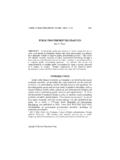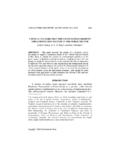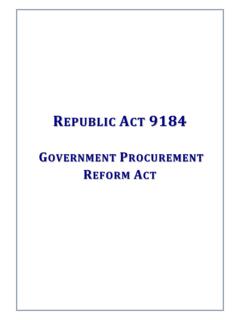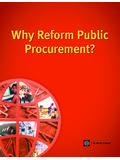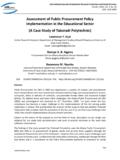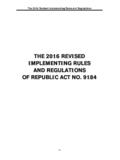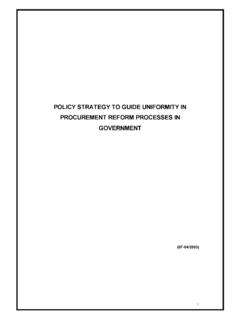Transcription of Chapter 16 A REVIEW OF PROCUREMENT PRACTICES IN THE …
1 Chapter 16 A REVIEW OF PROCUREMENT PRACTICES IN THE SOUTH AFRICAN PUBLIC SECTOR Intaher M Ambe and Johanna A Badenhorst-Weiss INTRODUCTION Public PROCUREMENT is a business process with a political system (Wittig, 2007; Watermayer, 2011). In South Africa, PROCUREMENT is of particular significance in the public sector and has been used as a policy tool due to the discriminatory and unfair PRACTICES of the past (Bolton, 2006). PROCUREMENT is central to the government service delivery system, and promotes aims which are, arguably, secondary to the primary aim of PROCUREMENT such as using PROCUREMENT to promote social, industrial or environmental policies (Cane, 2004).
2 Prior to 1994, public PROCUREMENT in South Africa was geared towards large and established contractors. It was difficult for new contractors to participate in government PROCUREMENT procedures. Nevertheless, public PROCUREMENT in South Africa has been granted constitutional status and is recognised as a means of addressing past discriminatory policies and PRACTICES (Bolton, 2006). Reforms in public PROCUREMENT were initiated to promote principles of good governance and introduced a preference system to address socio-economic objectives (Ambe, 2009).
3 The reform process was initiated due to inconsistency in policy application; lack of accountability; lack of supportive structures and fragmented processes. Mathee (2006) noted that a uniformed implementation approach to PROCUREMENT was required owing to the findings of a report on opportunities for reform processes in the South African government conducted by the joint Country Assessment REVIEW (CPAR) and the World Bank in 2001 438 AMBE & BADENHORST-WEISS (National Treasury [NT] Republic of South Africa, 2003].)
4 The deficiencies and fragmentations in governance, interpretation and implementation of the Preferential PROCUREMENT Policy Framework Act (PPPFA) (Act No 5 of 2000) resulted in the introduction of supply chain management (SCM) in the public sector as a policy tool (NT, 2005). In 2003, a SCM document named, "Supply Chain Management: A guide for accounting officers/authorities", was developed to give guidance to the adoption of an integrated SCM function and its related managerial responsibilities (NT, 2005).
5 This was the government s attempt to achieve desired strategic policy outcomes through public PROCUREMENT (McCrulden, 2004). However, despite the reform processes in public PROCUREMENT , the employment of SCM as a strategic tool, South Africa faces enormous challenges in its public PROCUREMENT PRACTICES . There is non-compliance to PROCUREMENT and SCM -related legislation and policies as well as tender irregularities (Smart PROCUREMENT , 2011).
6 According to Pretoria News (2011, October 13), Taxpayers were fleeced of R30 bn. Corruption, incompetence and negligence by public servants was to be blamed. The paper further asserted that about 20 per cent of the government s PROCUREMENT budget alone went down the drain each year. This was because officials stuck their fingers in the till, overpaid for products and services or failed to monitor how money was spent. Among government entities probed for PROCUREMENT irregularities was the Tshwane metro where about 65 municipal officials were investigated for striking business deals worth about R185 million with their own council (Pauw, 2011).
7 The Business Day report also affirmed that government spent billion in 2010 in ways that contravened laws and regulations. The national and provincial governments and their entities notched up R21 billion in irregular expenditure in 2010, a 62% rise over the previous year (R13 billion) ( Irregular State Expenditure, 2011). The Auditor General highlighted weaknesses in SCM, controls over information technology, human resource management, capital assets and performance reporting during a briefing to Parliament s standing committee on public account (Smart PROCUREMENT , 2011).
8 Public PROCUREMENT is deteriorating and "disappointing", especially in light of the considerable efforts to improve matters. It is worrying that the government is not making progress in PROCUREMENT and supply chain as fast and as good as it would want. A REVIEW OF PROCUREMENT PRACTICES IN THE SOUTH AFRICAN PUBLIC SECTOR 439 Against this background, the purpose of this paper is to REVIEW PROCUREMENT PRACTICES and challenges in the South Africa public sector. The paper employs a conceptual analytical approach and reviews relevant literature sources on public PROCUREMENT .
9 The paper also uses pertinent policy documents from the National Treasury website as well as other research documents relating to PROCUREMENT in the South African public sector. REVIEW OF PUBLIC PROCUREMENT Definition of Public PROCUREMENT Public PROCUREMENT refers to the government activity of purchasing the goods and services which it needs to carry out its functions (Arrowsmith, 2010). It is an information intensive function of government (Wittig, 2007).
10 According to Odhiambo and Kamau (2003), public PROCUREMENT is broadly defined as the purchasing, hiring or obtaining by any other contractual means of goods, construction works and services by the public sector. It involves the purchase of commodities and contracting of construction works and services if such acquisition is effected with resources from state budgets, local authority budgets, state foundation funds, domestic loans or foreign loans guaranteed by the state, foreign aid, as well as revenue received from the economic activity of the state.
